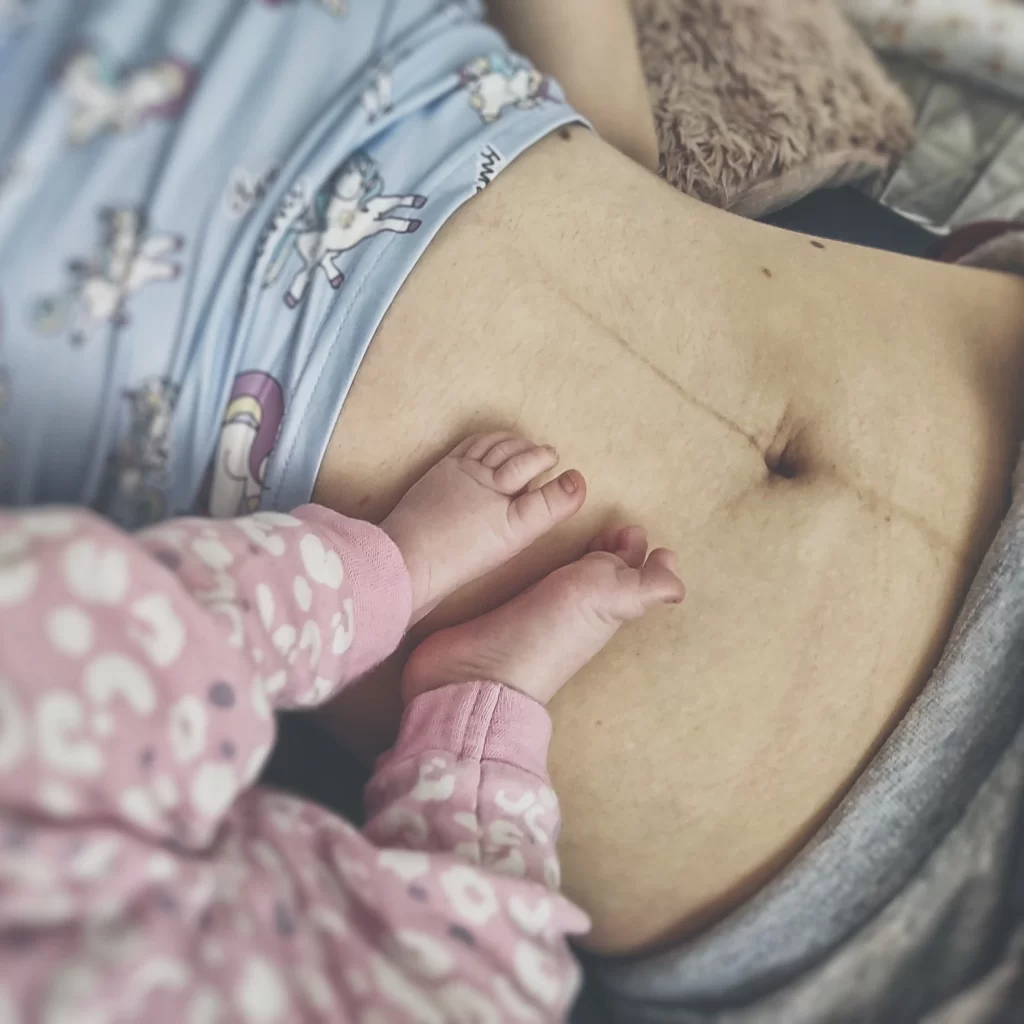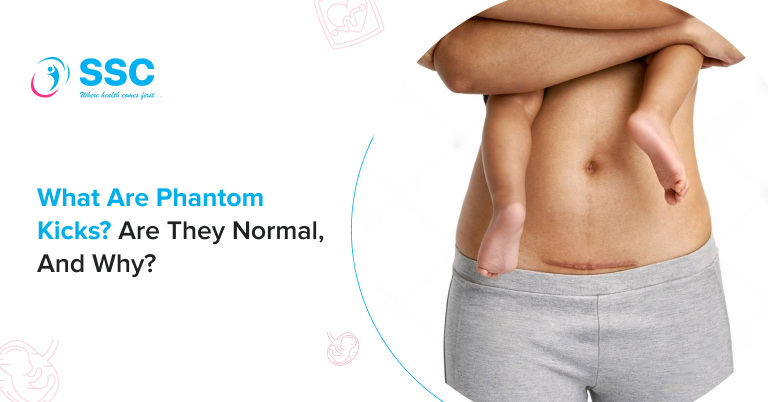Phantom Kicks After Pregnancy: Are They Normal? Here’s Why They Feel So Real
Feeling the first flutters and kicks is one of the most exciting physical experiences of pregnancy. However, what if those symptoms appear months or even years after giving birth? Phantom kicks are the feeling of irregular kicks on your stomach when you are not pregnant.
Even nine months postpartum, individuals can experience phantom kicks, where bowel movements feel like baby kicks, despite not being pregnant.
If this has ever happened to you, remember it’s completely normal, real, and more common than you think. This blog covers phantom kicks, their causes, and what to do if you’re experiencing them but aren’t pregnant.
What are Phantom Kicks?
Phantom kicks are the feeling of a baby moving in your abdomen even after pregnancy. In other words, the sensation of fetal movement in the abdomen after pregnancy or pregnancy loss is known as phantom kicks. They can be physically felt or seen throughout the abdomen and may resemble flutters or rapid movements. After giving birth, they may appear days, weeks, months, or even years later.
According to a 2021 study with 197 participants, about 40% of them experienced phantom kicks following pregnancy. Two-thirds of those who felt these emotions described them as “nostalgic or comforting,” while 25.7% stated they were “confused or upset.”
Although the exact cause of phantom kicks remains unclear, they are a confirmed phenomenon. These sensations are real, normal, and more common than often assumed.
Are Phantom Kicks a Sign of Pregnancy?
No, Phantom Kicks is not a sign of pregnancy but rather the effect of gas, stress, or even muscle spasms. The feeling of a baby’s kicks in your abdomen while you are not pregnant is known as phantom kicks. They can happen following a pregnancy, a pregnancy loss, or even in individuals who have never been pregnant.
The main difference between phantom kicks and genuine kicks is that the former are sensations of movement in the abdomen that aren’t coming from the baby, whereas the latter are the actual movements of the developing baby throughout pregnancy. Real kicks are the baby moving inside the womb, whereas phantom kicks are typically caused by gas, nerves, or muscular spasms.
What causes Phantom Kicks?
Experts often link phantom kicks to gas, increased body awareness, or the postpartum recovery period. Although there is no definitive reason, some speculate that it may have something to do with the body’s healing process or changes in the nerves during pregnancy.
The precise cause is still unknown due to the lack of information about the encounter. According to some theories, these sensations could be caused by changes in nerve receptors brought on by the uterus’s development during pregnancy.

Why do Phantom Kicks Happen?
We are aware that some women experience phantom kicks after birth, though the exact cause remains unclear. However, various experts have proposed potential explanations for why these unexplained kicks occur.
Postpartum Recovery:
During pregnancy, your organs shift to accommodate the growing baby, with your bladder, stomach, and intestines all moving. After birth, your body slowly works to return them to their original positions. This process can take time, and as your organs shift, you might experience sensations like kicks during your first year postpartum.
Nerve Dysfunction:
According to some experts, phantom kicks following pregnancy can resemble phantom limb pain, which is characterized by feelings in a body part that is missing. Mixed signals from nerves cause this. Some experts say that many people experience various phantom sensations, pain, or movements after suffering a loss, such as losing a limb.
According to research, 80–100% of amputees suffer from phantom limb syndrome, a condition in which people feel feelings in a limb that has been amputated.
Increased Awareness of Bodily Sensations:
You become very aware of your body during pregnancy, paying attention to every movement and keeping an eye out for labor symptoms. Phantom kicks can result from this increased awareness after birth.
Normal bodily functions, such as intestinal gas, can be mistaken for kicks due to heightened awareness following birth. These feelings could be confused with baby kicks because your brain is used to experiencing them during pregnancy.
Gastrointestinal Movements:
Postpartum, you’ll likely feel more gastrointestinal movement, something you may not have noticed before. Gas or normal intestinal contractions can trigger memories of baby kicks, especially since gas and bloating are common after pregnancy and can cause early phantom kicks.
Nerve and Muscle Memory:
The sensation of a baby kicking in your stomach is so unlike anything else you’ve ever felt. You become highly aware of every kick and movement throughout pregnancy, which might lead to the development of muscle and nerve memory. Even after your delivery, this may cause phantom kicks.
Pregnancy Loss:
Phantom kicks can also occur after a pregnancy loss or miscarriage. It’s important to understand that this is normal even though the loss didn’t immediately bring it on. Consult your physician if phantom kicks are hurting your mental health.
Phantom Kicks During Period Periods:
At the start of your period, cramping can make the muscles in your lower abdomen feel tight, which might feel like a gentle movement. Also, as the ovary stretches to release an egg, you might notice a sensation of small jumps or pops in your lower abdomen. These feelings, often mistaken for phantom kicks, are simply part of your body’s natural process during menstruation and ovulation.
What’s the Difference Between Phantom Kicks and Phantom Pregnancy?
| Phantom Pregnancy | Phantom Kicks |
A rare condition known as phantom pregnancy, or pseudocyesis, occurs when someone who isn’t pregnant exhibits the signs of pregnancy, such as morning sickness, a swollen belly, and missed periods. It can happen when someone honestly thinks they are pregnant, frequently as a result of mental stress. | Phantom kicks are the feeling of flutters in the abdomen, usually experienced after a miscarriage or after giving birth. In contrast to phantom pregnancy, they are typically unrelated to stress and do not result in physical pregnancy signs such as an enlarged abdomen or missed periods. |
How Long Do Phantom Kicks Last?
Many people claim to experience phantom baby kicks in the months or years following childbirth or pregnancy loss, but there isn’t much scientific research on the topic. Many years later, some people are still affected.
Participants in a 2021 study reported experiencing real kicks or flutters for an average of 6.8 years after giving birth, with one participant reporting experiencing them 28 years later.
How Often Do Phantom Kicks Occur?
Since there isn’t much research on phantom kicks, it’s difficult to determine how often experiencing them is normal. Some women experience them rarely, some feel them once a week, and some even have them many times a day.
Phantom kicks are not dangerous, but they can be unsettling. See your doctor for advice and help if they’re causing you distress or negatively impacting your mental health.
Are Phantom Kicks Something to Worry About?
Phantom kicks are generally harmless, but it’s important to consult a healthcare professional if they start to happen more frequently or start to worry you. Phantom kicks can have an impact on mental health, particularly for people who have lost a child or been pregnant.
Still, they usually don’t indicate a major medical problem unless they are accompanied by discomfort or swelling.
Although phantom kicks and postpartum depression are not significantly related, they may worsen anxiety, especially in stillbirth cases. A healthcare professional should be consulted if these feelings are upsetting to address any mental or physical issues.
Take Away:
To sum up, phantom kicks are frequent, mostly harmless, and frequently brought on by an increased awareness of body feelings. They often happen due to increased awareness of bodily sensations like gas or muscle cramps that feel similar to fetal movements. If you’re feeling uncertain, it’s always a good idea to check in with your doctor.
Frequently Asked Questions
Are Phantom Kicks a Sign of Pregnancy?
No, Phantom Kicks is not a sign of pregnancy but rather the effect of gas, stress, or even muscle spasms. The feeling of a baby's kicks in your abdomen, while you are not pregnant, is known as phantom kicks. They can happen following a pregnancy, a pregnancy loss, or even in individuals who have never been pregnant.
How to get rid of Phantom Kicks?
Try meditation to control your emotions and relax your abdominal muscles to reduce phantom kicks. Talking it with a gynecologist or counselor can help if it is connected to trauma. Seek assistance from a therapist to process any emotions to take care of your mental health.
How Long do Phantom Kicks Last?
Phantom kicks, or the feeling of fetal kicks after pregnancy, can last for years or even decades after giving birth. While most people stop feeling phantom kicks after a few months, some report feeling them for years.
Difference between Phantom Kicks and Real Kicks
The main difference between phantom kicks and genuine kicks is that the former are sensations of movement in the abdomen that aren't coming from the baby, whereas the latter are the actual movements of the developing baby throughout pregnancy. Real kicks are the baby moving inside the womb, whereas phantom kicks are typically caused by gas, nerves, or muscular spasms.
Can Gas Feel like Baby Kicks?
Yes, gas can feel like baby kicks, causing fluttering or bubbling in the abdomen. However, it’s usually different because it lasts a shorter time, lacks a rhythm, and doesn’t cause any physical changes.
Can Phantom Kicks Occur Before Your Period?
Phantom kicks before a period can occur due to hormonal changes, bloating, or gas. Although these sensations could resemble baby movements, it is believed that the body's reaction to changes in the menstrual cycle may be what causes them.









